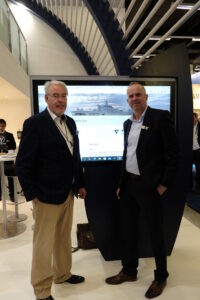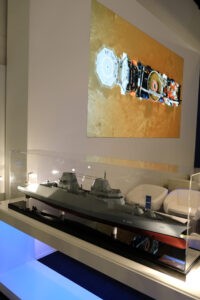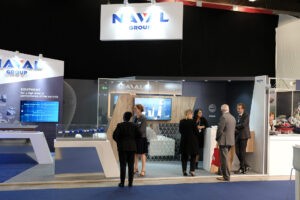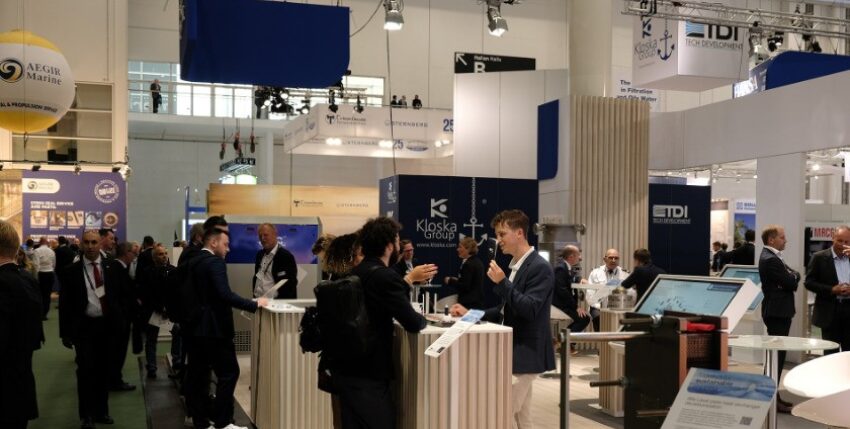Innovations for climate protection and increased efficiency took centre stage at this year's SMM. Nevertheless, the industry is facing difficult times.
After a four-year break (not only) due to the coronavirus pandemic, the global shipbuilding industry met in Hamburg at the beginning of September for its 30th world-leading trade fair for the maritime industry. The SMM (Shipbuilding, Machinery & Marine Technology International Trade Fair) was held under the motto "Driving the Maritime Transition". The focus was therefore on the maritime energy transition, digital transformation and climate change. Among the 2,000 exhibitors from 100 countries, around 800 companies from Germany alone were represented. The patron of the trade fair was Federal Chancellor Olaf Scholz, who emphasised the growing importance of the maritime industry and economy for Germany in his opening speech, which was broadcast via video. He welcomed the fact that SMM has focussed on climate-friendly technologies, as "every innovation in the maritime sector benefits the global economy as a whole". In her opening speech, the Federal Government's Coordinator for Maritime Economy and Tourism, Claudia Müller, assured the maritime industry of her full support in the energy transition. "Germany's top priority at the moment is to give the industry planning security for the necessary investments and to expand the production of low-carbon and carbon-free fuels and technologies." For the first time, the Federal Ministry for Economic Affairs and Climate Protection had its own stand at SMM.

Maritime energy transition
The maritime economy and industry are currently in the midst of a period of upheaval. The maritime energy transition is specifically aimed at moving away from heavy fuel oil as the standard fuel for shipping. Shipping is to become climate-neutral by 2050 in order to contribute to the fulfilment of the Paris Climate Agreement's target of limiting global warming by 1.5 percent. 300 million tonnes of fuel are burned by the world's large ships every year. This accounts for around 2.5 per cent of global CO2 emissions. There is no improvement in sight for the time being. However, a tour of the eleven exhibition halls, which covered the entire value chain of the maritime industry, showed that practically all exhibitors have already responded to the challenges of the maritime energy transition with innovations. The large companies in particular focussed on efficiency, sustainability and CO2-free fuels such as methanol, synthetic gas, hydrogen and ammonia. Dual-fuel propulsion is intended to ensure that ships become independent of the availability of alternative fuels. The corresponding technologies for realising the maritime energy transition were presented at SMM. New technologies such as fuel cells, e-fuels and new engines are set to drive innovation in the maritime industry. For example, the shipping company Hapag-Lloyd aims to be climate-neutral by 2045 and increase the efficiency of its own fleet. Over 150 ships are to be modernised and run on biofuels, 86 will receive new propellers, 36 a new bow nose and others new paintwork to reduce fuel consumption. The new, 35-tonne, highly efficient propellers reduce the fuel consumption and CO2 emissions of a container ship by around 13 percent. The engine manufacturer MAN presented its first marine engine that can run on methanol or conventional fuel at the trade fair. An engine that runs exclusively on ammonia is set to follow by 2024. MAN also wants to utilise engine performance even better with the help of algorithms based on artificial intelligence. Engine manufacturer Rolls-Royce showcased fuel cell concepts, hybrid systems and engines that will run on e-methanol. However, all these innovative technologies are not enough to fulfil the Paris targets.

This is the conclusion of a MAN study presented at the trade fair. According to the study, ship capacities will increase by 60 per cent over the next 30 years. CO2-free fuels will be increasingly used, so that emissions will only increase by ten per cent in the following decade despite the 60 per cent growth in the fleet. Although they will decrease thereafter, the turnaround is too slow. International shipping is overspending its CO2 budget to such an extent that it will be virtually impossible to achieve zero emissions by 2050. Emissions will only fall from the current 1.2 billion tonnes of CO2 to 400 million tonnes. In order to achieve the target of 1.5 degrees, the study calls for the existing fleet to be retrofitted and for the shipbuilding industry to be encouraged to channel its investments into the production of environmentally friendly fuels through new rules and regulations. Ultimately, the global challenge in the shipbuilding industry is to successively retrofit the current 60,000 merchant ships in favour of greater environmental and climate compatibility.
Maritime Security and Defence

The international maritime security conference Maritime Security and Defence (MS & D) was once again held over two days at the 30th SMM. This year's theme was Protecting the Seven Seas. The conference focussed on current and future threats to global and regional maritime security. The wide range of topics included the Ukraine conflict, cyber security in naval operations, conflicts in the Indo-Pacific, China's naval armament and expansionist ambitions in the Arctic, Africa's perspectives on maritime security, harbour protection, operations in coastal waters and the Deu Marfor military command staff. Hypersonic weapon systems, new minehunting units, unmanned surface vehicles (USVs), systems for munitions clearance in the North and Baltic Seas and alternative fuels for naval units were also discussed.
On the anniversary of this year's SMM, it became increasingly clear that the maritime industry is increasingly dominated by Asia. Nevertheless, the fact that the entire shipbuilding world was once again able to come to Hamburg for four days as the "United Nations of Shipbuilding" is also proof and an expression of an efficient and innovative maritime industry in Germany. It repeatedly manages to assert its technological leadership in the maritime transition. Above all, the world's leading trade fair remains an essential and indispensable place to find out about the latest technologies in a complex value chain and to build up corresponding networks. The 30th SMM provided decisive impetus for the realisation of the maritime transformation in the race against time and climate change. The next SMM will take place in Hamburg in 2024.
Dieter Stockfisch










